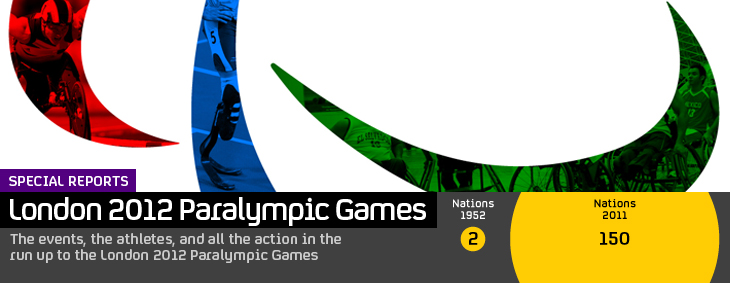Fastest man on no legs eyes Olympic glory
In 2012 blade runner Oscar Pistorius aims to make history by becoming the first disabled athlete to compete in both Olympic and Paralympic Games. Keme Nzerem went to meet him.
With a clutch of gold medals to his name South African athlete Oscar Pistorius is known as the blade runner.
Oscar Pistorius was born 24 years ago without a calf bone on either leg and was amputated below both knees before his first birthday.
He is now the world’s most famous paralympian and will be just one of the athletes competing on Saturday in the World Cup in Manchester – one of the key disability sports events ahead of the London 2012 Games.
With big name sponsors racing to catch him, the fastest man on no legs is redefining what it means to be a professional athlete.
“My first Paralympic Games was in 2004 in Athens and on the day of the biggest turn-out I think we had 23,000 people,” Pistorius told Channel 4 News reporter Keme Nzerem.
“In Beijing we had just over 93,000 people. Paralympic sport has helped to change the perception people have about disability.
“We often think people with disabilities are incapable of doing everyday things, but when you see them on the field or on a track it just shows you that they are sometimes more capable than a lot of able-bodied people.”
Pistorius now says his qualifying times are so fast he should be allowed to compete in the Olympics themselves.
“I’m not too far from the qualification time so I’ll be using the season as a stepping stone in order to make sure that when I step out in the stadium its both for the Olympic Games and the Paralympic Games,” he told Channel 4 News.
Pistorius has faced an uphill battle to compete with the able bodied athletes in the Games – he had to take the athletics governing body to court to prove his prosthetic legs don’t give him an unfair advantage.
“We did the tests and we proved that a prosthetic leg doesn’t provide an advantage,” he said.
“The legs have stayed the same for about six or seven years now, but where it does really make a difference is in the training and the preparation.
“Experience counts a lot so gaining a race you learn a little bit more, you gain that vital experience that one needs and I think that’s going to help a lot this year. I’ve got some really good races coming up which I think will give me motivation in order to be prepared for next year.
“I think the world is definitely embracing the paralympic movement and disabled athletes that are looking to compete in mainstream able bodied sports.”
The three gold medals Pistorius won in Beijing were at the Paralympics. He wasn’t fast enough to make it to the Olympics but he’s running faster this year and has provisionally qualified to run.
As the paralympic movement grows, Pistorius has seen fresh young disabled athletes inspired by his determination and skill.
Britain’s Johnny Peacock lost one lower leg to meningitis as a baby and decided to give running a go after seeing Pistorius in action.
Two years later and he is aiming to qualify for London 2012 and is already looking ahead to make an impact at Rio.
“I saw Oscar running and thought, ‘Wow! I want to try that too!'” he told Channel 4 News.
-
Latest news
-
Ex-Trump lawyer Michael Cohen testifies at hush money trial3m

-
Racial hate speech laws being ‘weaponised’ warns National Black Police Association7m

-
‘Hard to believe so many women going through such horrors’, says woman whose baby daughter was stillborn8m

-
Damning report condemns ‘shockingly poor’ UK maternity services12m

-
People ‘expecting the West to stand by Georgia’, says opposition party leader5m

-





